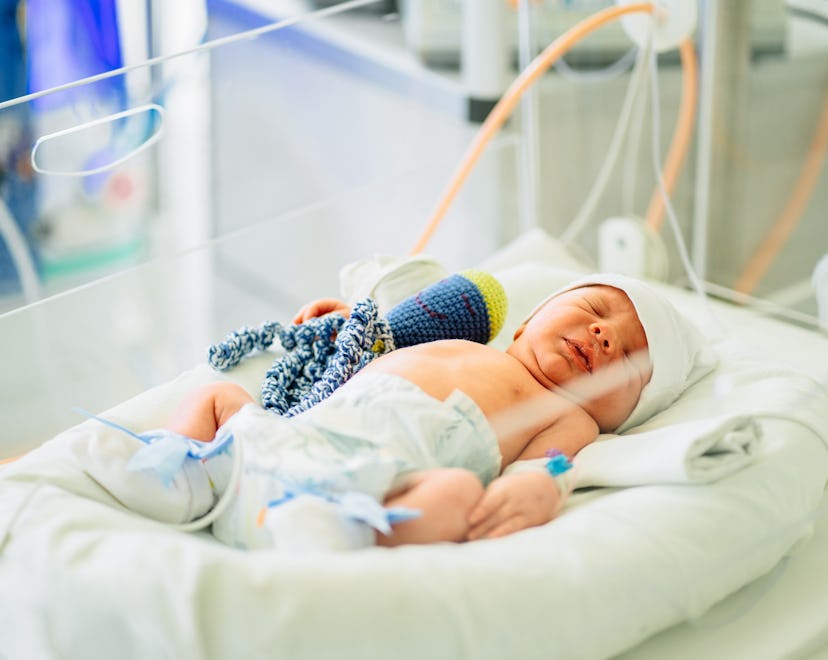Newborn

What NICU Means & What To Expect From A NICU Stay
It’s the best place for a hospital’s tiniest patients.
When you go to the hospital to have your baby, you naturally assume that you’ll soon be back home with your little one. But not all babies head home a day or two after delivery, and some will require a stay at the hospital’s Neonatal Intensive Care Unit (NICU). When you’re told as a new mom that your baby needs to be in the NICU, it can be totally terrifying. Or, depending on what went on during pregnancy, it may be something you’ve prepared for and expect. As a mom who has had three of my four babies in the NICU directly after delivery, I can tell you firsthand that if there’s a medical issue with your child, there’s no better place for them to be than in the NICU.
What is the NICU?
After your baby is born, your OB-GYN might recommend that they go to the NICU for further observation and testing. But what is the NICU? “NICU stands for Neonatal Intensive Care Unit,” Dr. Cherilyn Cecchini, a board-certified pediatrician, tells Romper. “It is a place in the hospital that takes care of sick or premature newborns.” And in case you were wondering, the term “neonatal” refers to the first 28 days of life, Cecchini explains.
But how do you even pronounce the acronym NICU? Well, it can vary hospital to hospital, or even doctor to doctor. Most medical professionals will pronounce NICU as “Nick-U” or “Knee-Q,” while others might choose to spell out the letters themselves (i.e. “N-I-C-U”). No matter how your OB-GYN or labor and delivery nurses say it, they are all referring to the same place in the hospital that provides critical care to newborns.
The medical staff that takes care of these beautiful babies is unlike any other in the hospital. “The health care team that works in the NICU has specialized training to help support these babies,” Dr. Krupa Playforth, a pediatrician, explains to Romper. “There are several ‘levels’ of NICU — some have more specialized equipment and more highly trained personnel and can handle more severe conditions.”
When do babies go to the NICU?
Your OB-GYN might have a sense that your baby may have to go to the NICU during your labor or delivery. Usually, though, your child will be sent to the NICU sometime after birth, and the reasons can vary depending on your child’s condition. “Babies go to the NICU if they require a higher level of care than a newborn nursery or a mother-baby floor,” Dr. Kathryn Winn, a neonatologist at the Orlando Health Winnie Palmer Hospital for Women & Babies. “For example, we take care of babies that are born prematurely, have congenital anomalies (i.e. heart disease or those that need surgery), those that need help breathing, and babies with infections.” Sometimes, babies born around their due dates are also admitted to the NICU, according to Winn, if they are not ready to breathe without assistance or if they are very stressed by delivery and need a higher level of care.
How long do babies typically stay in the NICU?
Some babies have shorter stays in the NICU than others — for example, some might stay for a few hours, while a preemie might be in the NICU for weeks. It really depends on why the newborn was admitted to the NICU in the first place, explains Playforth. “For example, a baby born prematurely may need to stay in the NICU for several weeks or months as their bodies mature and develop independent abilities to maintain stable vital signs, breathe, feed, and grow,” she says. “Some babies are in the NICU just for a few hours as they transition, and others may need to complete an antibiotic course before they are discharged.” In some cases, according to Cecchini, babies might go straight home from the NICU, while others may be transferred to another unit in the hospital if they require less frequent monitoring as they continue to improve before they go home.
“Some term babies who need a day or two of breathing support or antibiotics may be able to go back to their mother’s room or be discharged home within a couple of days,” adds Winn. “Babies who are born prematurely often have to stay with us until they get closer to their due date because that’s when they’re mature enough to breathe and eat and stay warm without additional assistance.” For some babies that could be a few weeks and for other babies that can be several months.
If your child needs additional medical attention after they’re born, they might go to the NICU, where they’ll receive tender loving care from trained professionals. Their only goal, after all, is to get the hospital’s tiniest patients well again and home with their families.
Experts:
Dr. Cherilyn Cecchini, M.D., a board-certified pediatrician
Dr. Krupa Playforth, M.D., a pediatrician
Dr. Kathryn Winn, M.D., a neonatologist at the Orlando Health Winnie Palmer Hospital for Women & Babies
This article was originally published on